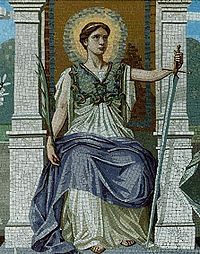Distinction between rule of law and rule by law.
Phân biệt giữa Pháp Trị [Rule of law] và Pháp Quyền [Rule by law].
(1) Rule of law is an intrinsically moral notion. Indeed, I don’t see how one can have a consistent theory of rule of law without appealing either to natural law theory or to some higher rule by law (e.g., divine command theory).
(2) Rule by law is very different, despite some superficial similarities. Rule by law is prudential: one rules by law (properly speaking) not because the law is higher than oneself but because it is convenient to do so and inconvenient not to do so. In rule of law, the law is something the government serves; in rule by law, the government uses law as the most convenient way to govern.
(3) The two chief arguments for rule by law rather than rule of law are exactly the same ones that are always used against natural law theory:
(a) disagreement and uncertainty in moral judgments;
(b) the claim that rule of law is seminal anarchy.
(a) the question of how one can have authority without any moral basis;
(b) the claim that rule by law is seminal despotism.
Siris
The Internal Morality of Chinese Legalism
Kenneth Winston
Harvard University – Harvard Kennedy School (HKS)
June 2005
KSG Working Paper No. RWP05-041
Abstract:
It is widely held that there are no indigenous roots in China for the rule of law; it is an import from the West. The Chinese legal tradition, rather, is rule by law, as elaborated in ancient Legalist texts such as the Han Feizi. According to the conventional reading of these texts, law is amoral and an instrument in the hands of a central ruler who uses law to consolidate and maintain power. The ruler is the source of all law and stands above the law, so that law, in the final analysis, is whatever pleases the ruler. This essay argues, to the contrary, that the instrumentalism of the Han Feizi is more sophisticated and more principled than the conventional reading acknowledges. It suggests that, by examining the text of the Han Feizi through the lens provided by American legal theorist Lon Fuller, we can detect an explicit articulation of what Fuller called the internal morality of law. The principles of this morality are elaborated and their importance explained. In this way, the Han Feizi is retrieved as a significant reference point for thinking about legal reform in China today.
Rule of law
The rule of law is a legal maxim that includes the principles that no person is above the law, and that no one can be punished by the state except for a breach of the law. The rule of law stands in contrast to the idea that the sovereign is above the law (rex lex), a feature of Roman Law and certain other legal systems.
At least two principal conceptions of the rule of law can be identified: a formalist or “thin” and a substantive or “thick” definition of the rule of law. Formalist definitions of the rule of law do not make a judgment about the “justness” of law itself, but define specific procedural attributes that a legal framework must have in order to be in compliance with the rule of law. Substantive conceptions of the rule of law go beyond this and include certain substantive rights that are said to be based on, or derived from, the rule of law.
Rule by fear or rule by law?
– Winston Churchill, Nov. 21, 1943
Since 9/11, and seemingly without the notice of most Americans, the federal government has assumed the authority to institute martial law, arrest a wide swath of dissidents (citizen and noncitizen alike), and detain people without legal or constitutional recourse in the event of “an emergency influx of immigrants in the U.S., or to support the rapid development of new programs.”











































